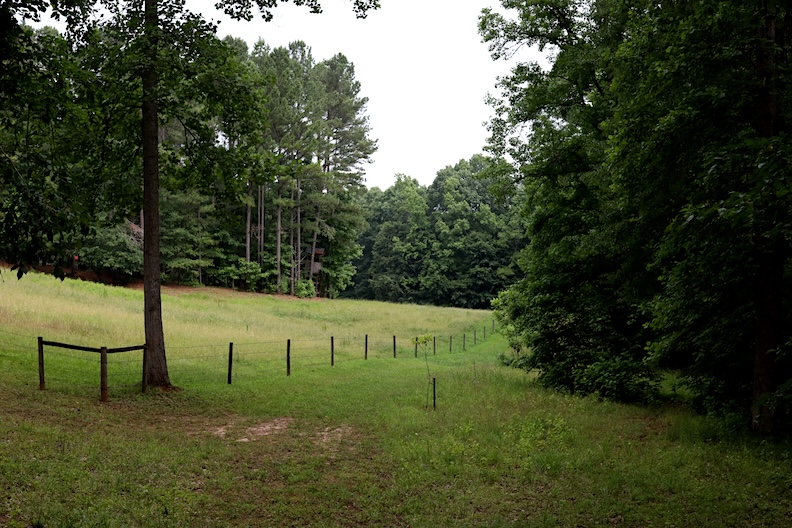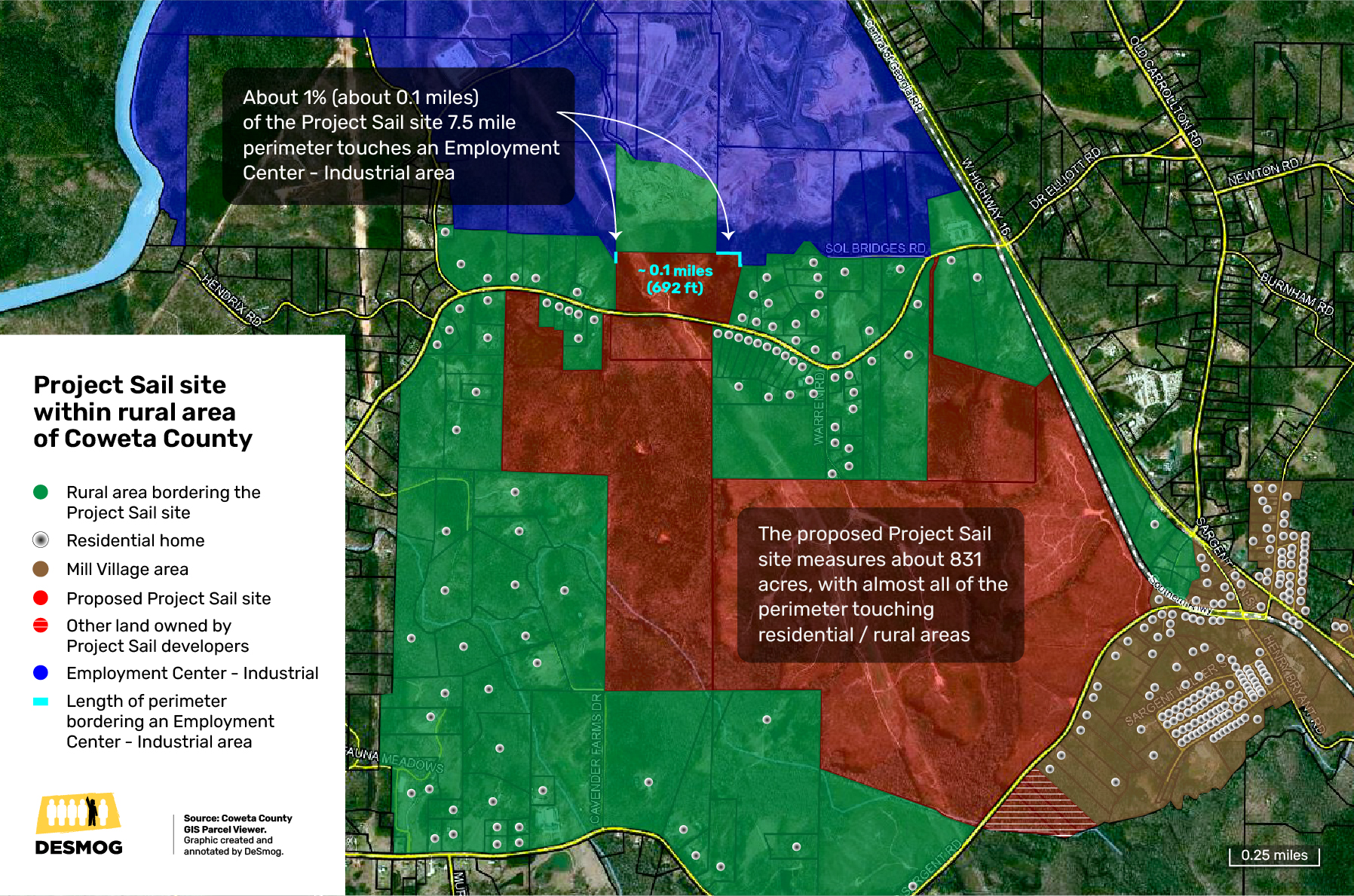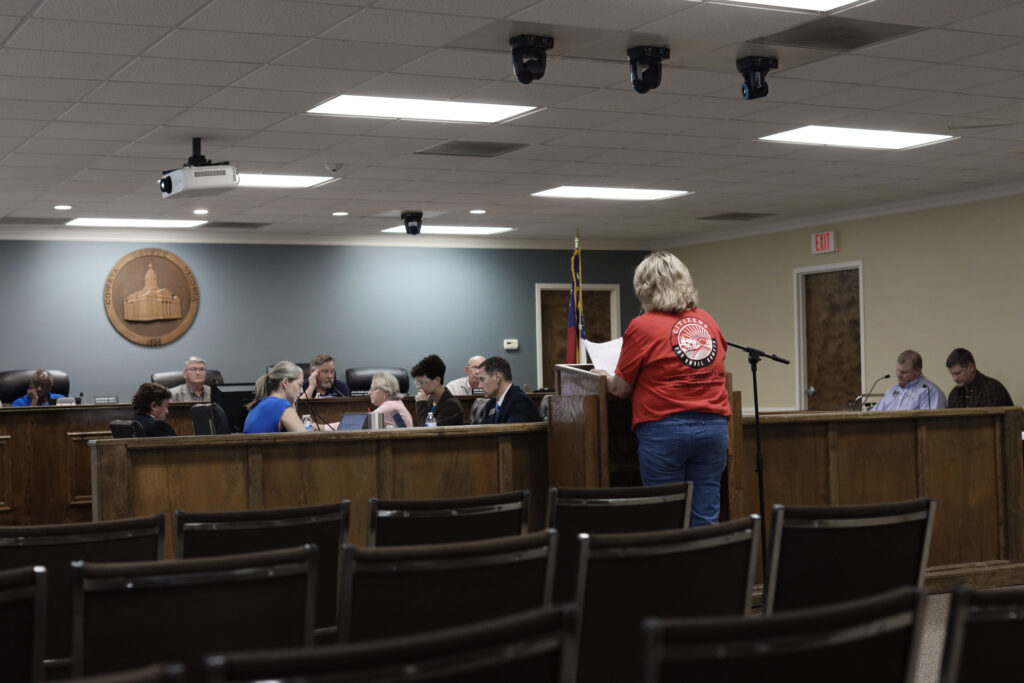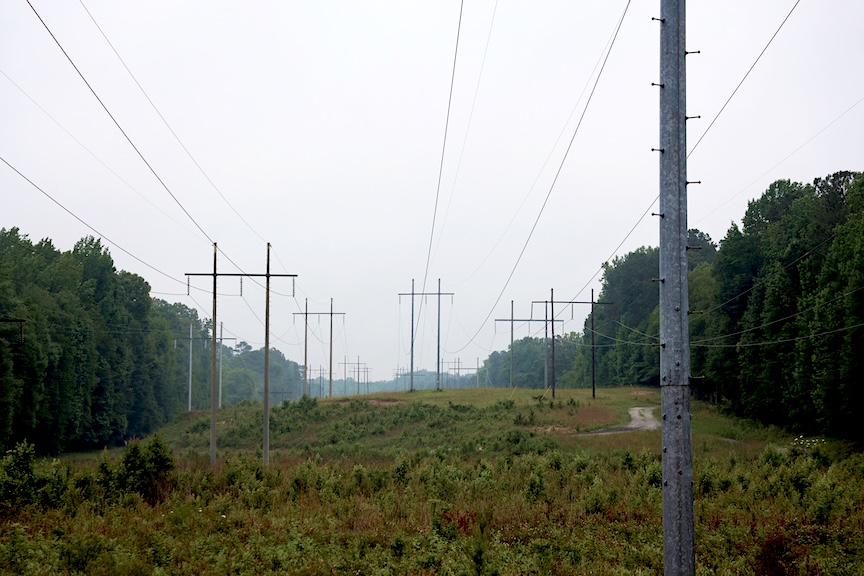County commissioners in Georgia may pave the way for a $17 billion “hyperscale” data center on Tuesday by adopting new planning laws shaped by industry lobbyists.
If passed, the latest draft of the laws will ease requirements for “Project Sail” — a proposed data center in a rural area of Coweta County, 40 miles southwest of Atlanta — relative to a more stringent version proposed last month.
One of the biggest planned complexes of its kind, Project Sail is a joint venture between San Francisco-based Prologis (NYSE:PLD), the world’s largest industrial real estate company, and Georgia-based developer Atlas Development.
A DeSmog review of public records suggests that industry lobbyists and company representatives prevailed upon Coweta County officials to dilute earlier versions of the proposed planning rules for data centers.
Specifically, residents opposing Project Sail are concerned that the latest draft of the rules — known as an ordinance — no longer includes certain provisions designed to limit adverse environmental impacts and require special public hearings for proposed data centers.
Proposals that would have made it harder to rezone rural areas to make them eligible for data centers have also been left out. Developers argue that data centers should be classified under the “light industrial” category of the county zoning code — which has traditionally been applied to developments such as gas stations, textile mills, or warehouses.
“The ordinance as it currently stands flagrantly favors developers and strips residents of any protection,” said Laura Beth, chairperson of the Citizens for Rural Coweta community group.
Leigh Ann Green, a local consultant working for Atlas Development, disagrees. “The county’s ordinance that they are passing is more stringent than any data center ordinance that we’ve seen.”
The ordinance could be approved by a majority of Coweta County’s five commissioners on Tuesday, August 19 if a public hearing due to take place at the Commission Chambers in the county capital of Newnan at 6 p.m. local time moves to a vote.

At about 831 acres, the proposed Project Sail site in Coweta County’s Sargent community could fill Truist Park, the Atlanta Braves baseball stadium, 53 times. The project is predicted to use up to 900 megawatts (MW) of power capacity — about 14 times more than the total power demand of Atlanta’s airport, the busiest in the world — and consume up to nine million gallons of water a day, according to Atlas Development’s rezoning application for the project.
To meet surging power demand, state power utility Georgia Power is expanding its generating capacity, including at the Plant Yates gas-fired power plant, near the Project Sail site, which had previously faced retirement. Prologis says on a website for Project Sail that “this location was chosen primarily because of its proximity to exisiting power infrastructure.”
Georgia is the nation’s fastest-growing data center market in terms of new construction and leasing rates, according to global real estate services company CBRE. Coweta County is a hotbed of planned projects — spurred on by surging demand for computing power to fuel artificial intelligence (AI).
It’s a pattern playing out across the country, as rural communities suddenly find themselves the target of data center developments due to their location near power plants and transmission lines. So far this year, in places such as Pittsylvania County, Virginia; Oldham County, Kentucky; and Monroe County, Georgia, local residents have pushed back against county rezoning requests from large data center developments.

‘A Great Thing for the County’
Data center advocates in Coweta County include some area real estate agents — who say that the projects will boost the local economy by bringing in millions of dollars in tax revenue. Prologis and Atlas Development say this will reach about $100 million a year at full build-out.
“I think it’s actually a great thing for the county,” Jonathon Ward, owner of Atlas Development, told DeSmog. “I don’t know what else you can do to bring in that kind of tax revenue.”
Local critics have questioned the tax figures floated by developers.
Ward said that the data centers represented a low-impact opportunity for the county, which would not strain public services and resources. He added that the Project Sail developers had downsized plans to build 13 data center buildings to nine following public feedback, and that they would pay for all power upgrades to service the site.
“We try to do our best and work with all the surrounding neighbors,” Ward added. “A lot of people against this don’t live directly next to this project.”
Atlas Development told DeSmog that a special environmental impact analysis required in previous versions of the ordinance was dropped by the County to bring it in line with local, state, and federal laws, and that the draft still includes measures to protect local citizens from noise, light, traffic, and other impacts. Atlas Development also mentioned measures in the ordinance to impose setbacks of 300 feet from any homes. The company said that it did not hire any lobbyists in Coweta County.
A Prologis spokesperson shared a link to the Project Sail website which states that Project Sail “will create real economic opportunities” including “skilled jobs and consistent revenue that helps fund priorities we all care about like roads, emergency services, and public schools.”
But since news of Project Sail was made public in December, county residents have written more than 150 times to commissioners stating their opposition to the project, according to the Citizens for Rural Coweta community group.
Sargent residents fear industrial sprawl, noise, air and light pollution, and constant construction traffic. “No Data Center” signs line local roads, and many residents have voiced their opposition at county meetings.
Lobbyists Step In
The new ordinance was developed following a similar public outcry over a decision to approve another data center complex — the 700 MW Project Peach — in the Palmetto area of Coweta County in April. Project Peach is being developed by a Dallas-based company called CyrusOne in partnership with North Coweta Investors, linked to Atlanta-based Strategic Real Estate Partners.
Coweta County imposed a 180-day moratorium on new data center developments on May 6. The county’s commissioners and staff have since been working on the ordinance draft. But opponents of the plan say that their calls for stricter controls on data center development in the county’s rural areas have so far been largely ignored.
Using public records obtained from Coweta County, DeSmog found that data center developers from California, Texas, Virginia, and Georgia are seeking to shape Coweta County’s proposed data center ordinance in their favor.
Among the individuals representing data center developers in communications with Coweta County staff and commissioners is Arthur “Skin” Edge IV, a county resident and prominent lobbyist working for the GeorgiaLink Public Affairs Group, one of Georgia’s most influential lobbying firms, the public records show.
On July 7, Edge emailed Coweta County commissioners Jeff Fisher and John Reidelbach and county administrator Michael Fouts from his GeorgiaLink Public Affairs Group email address on behalf of the “Project Sail team” with detailed suggestions related to the data center ordinance. The recommendations included a request to push back requirements to conduct environmental impact assessments until after the kind of rezoning process needed to allow data centers to be built by reclassifying “rural conservation” land as “light industrial.”
This means that prospective data center developers can submit a land rezoning application — which is subject to a public hearing and majority vote from the five county commissioners — without presenting specific details about various environmental impacts.
Edge previously represented Project Peach developers CyrusOne and North Coweta Investors at an April rezoning hearing. On June 19, Edge also wrote comments to commissioners about the ordinance on behalf of an unnamed “data center client” which asked for looser limits on testing on-site gas-powered generators, according to the records.
County staff presented at least six of Edge’s comments at a July 22 work session — an open meeting in which staff and commissioners discuss county business — as part of a “consolidated feedback” document related to the data center ordinance.
Of the 64 comments included in the “consolidated feedback” document, the only substantial comments calling for stricter regulations came from Arpeggio — an independent consultancy hired by the County to provide guidelines on noise impacts — which were later added by commissioners and staff into the ordinance draft.
At the July 22 meeting, commissioner Al Smith expressed confusion on where the pro-industry comments in the ordinance draft came from. “Do those suggestions come from anonymous people?” Smith asked Fouts, the county administrator.
Fouts replied that private citizens, commissioners, and developers provided the comments in the “consolidated feedback” document. Earlier in the session, Fouts stated that some citizen feedback was provided in meeting notes from a first public hearing on the data center ordinance on July 15.
DeSmog was able to identify the authors of the anonymous comments in the “consolidated feedback” document by matching them to emails obtained through a public records request. The majority came from developers, their representatives, or lobbyists; some from commissioners Reidelbach and Fisher; and none from citizens calling for tougher regulations.
Local developer Brent Holdings submitted 13 comments appearing in the document, among them a request to raise the height limit on data centers to 90 feet, about three times higher than the 34-foot limit normally allowed in the county’s light and heavy industrial districts.
Virginia-based data center financier American Real Estate Partners submitted nine comments featured in the document, including an argument that data center sites should not be limited by the “comprehensive plan” — a document guiding long-term development in the county.
Emails from the public records suggest that Brent Holdings and American Real Estate Partners are teaming up on a not-yet-public data center project in the county called “Project Pegasus.” The companies were represented by attorney Steven Jones of Atlanta-based law firm Taylor Duma at the July 15 public hearing.
As the draft stands, the ordinance will allow data centers on “light industrial”-zoned land with “any” border with an “Employment Center – Industrial” or “Interstate Gateway” areas of the comprehensive plan, conditions which local critics say are too lenient for developers.
On June 3, Green, the local consultant — asked county staff to confirm if part of the Project Sail site bordered an “Employment Center – Industrial” area, according to the records.
About 1 percent of the Project Sail site’s 7.5 mile perimeter touches an “Employment Center – Industrial” area, DeSmog found, with almost all of the perimeter touching areas designated as “Rural Place” or “Mill Village” in the county comprehensive plan.
During the July 22 data center ordinance work session, commission chairman Bill McKenzie stated, “My issue is to come in and to take rural land and rezone it just because they’ve got five acres touching an ‘M’ [heavy industrial] zoning.”
At the end of the meeting, however, the provision allowing data centers on land with “any” border to an industrial employment district remained unchanged, as long as developers obtained permission to rezone the land to “light industrial.”
Environmental Rules Scrapped
Opponents of Project Sail had hoped that stricter environmental regulations in the ordinance would make rezoning the 831-acre “rural conservation”-zoned tract slated for the site to “light industrial” more difficult. The date of an impending rezoning hearing has yet to be determined.
So far, none of the feedback from opponents of the project has made it into the ordinance text, beyond some noise regulations.

Detailed comments submitted by several private citizens to the county about the data center ordinance included requests to allow data centers only in existing industrial zones; establish enforceable noise limits; and mandate rules for blasting during the construction process.
Chris Manganiello of regional environmental nonprofit Chattahoochee Riverkeeper, whose comments were excluded from the county’s “consolidated feedback” document, asked that the data center ordinance include provisions that require an environmental site analysis; a water management plan; and require community meetings, among other requests.
When an employee for Georgia’s Department of Natural Resources published what he said was an independent analysis on Project Sail’s environmental impact, commissioner John Reidelbach wrote the state agency from a private email address asking that the employee be “reprimanded” and forced to retract “misinformation” about the project, according to a public document first reported by the Newnan Times Herald on Friday.
Instead of adding environmental regulations at the July 22 work session, commissioners and staff removed the requirement for an environmental impact analysis to study adverse impacts from data centers early in the permitting process.
The requirements had been included in a draft of the ordinance, published on June 5 that stated that data centers would require an environmental impact analysis which “must include but not limited to the following site features: geotechnical, wetlands, floodplain, streams[,] stream buffers, slopes exceeding 25 percent, vegetation, wildlife species, archeological/historical.”
That wording no longer features in the current ordinance draft.
American Real Estate Partners declined to comment.
Brent Holdings, Cyrus One, North Coweta Partners, and Taylor Duma did not respond as of publication.
Both Atlas Development and Prologis told DeSmog that they were not being represented by Edge, the GeorgiaLink Public Affairs Group lobbyist. The GeorgiaLink Public Affairs Group did not respond to a question about its current data center clients in Coweta County. None of the companies linked to Project Sail and Project Peach are listed as clients on the firm’s website. Monthly disclosure reports sent by the company to the Georgia Ethics Commission, a state agency which provides transparency around lobbying, do not show the companies among the firm’s clients, according to a DeSmog review of the reports.
The reporting for this story was supported by the Fund for Investigative Journalism.
Subscribe to our newsletter
Stay up to date with DeSmog news and alerts






